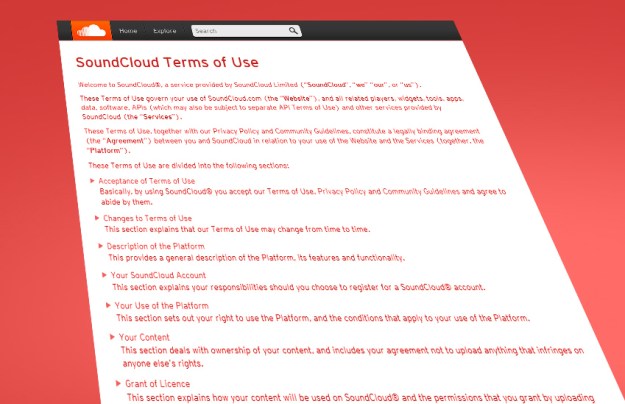
If you have a band or podcast, you had better be on SoundCloud – because that’s where people are looking to discover new music and artists. In the five years since its launch, SoundCloud has solidified its spot as a leading audio-distribution service thanks to its simple listening and uploading functionality, easy sharing and embedding of tracks, and unique commenting system.
As we saw with the short-lived Instagram debacle, however, terms of service matter, especially when you’re handing over your intellectual property to a company. So how does SoundCloud handle copyright issues and user content ownership? Let’s take a look.
Terms of Use
Looking at SoundCloud’s overall terms of use, the document does exactly what we like to see here at T&C: Summarizing. It’s simply the right thing to do, to help ensure that users know what they are getting themselves into by using the service. And it’s especially the right thing to do because SoundCloud’s full terms rival the verbosity of War and Peace. Fortunately, they are also written in natural language, so you don’t need to pass the Bar to know what the heck SoundCloud is talking about.
As far as what the terms say, well, it’s all darn good – just the kind of user rights and protections we should celebrate, because they are so rare. Here are the key things you need to know about SoundCloud’s terms of use.
Your account is your account
As with most companies, SoundCloud makes it your responsibility to keep your account login credentials a secret. Unlike other companies (*cough* Facebook *cough*), SoundCloud makes it easy to delete you account, should you choose to do so. If you do, all of your uploads and most other account will be “irretrievably deleted by SoundCloud.”
List all the rules!
SoundCloud has a ton of rules – 19, to be exact – all of which you can see here. But here are the ones I would guess most people are likely to break: No uploading content that you don’t own. No buying or automating plays on your content to make it look like you have more fans than you do. No posting any “offensive” content (as determined by SoundCloud). And no ripping songs off of SoundCloud. Break the rules, and SoundCloud may delete your account.
This is especially true of copyright violations. SoundCloud repeats how serious it is about copyright through its terms. And it warns users that you could get sued by rightful copyright owners if you repeatedly infringe on copyright. So stick to your own music, will you?
Own it
This is perhaps the most important provision in the entire SoundCloud terms: You retain ownership of everything you upload to SoundCloud. And “SoundCloud does not claim any ownership rights in Your Content.” This is exactly as it should be – well done, SoundCloud. Well done, indeed.
Keep in mind that you are, however, giving SoundCloud a “limited, worldwide, non-exclusive, royalty-free, fully paid up, licence” to other SoundCloud users, which basically lets them play and share your tracks – which is the point, right?
Meet up at your own risk
One provision that is particularly unusual – but maybe it shouldn’t be! – is SoundCloud’s waiver of responsibility for SoundCloud community meet-ups. Basically, if you go to a meet-up that’s centered around SoundCloud, and something bad happens, SoundCloud excludes itself from all liability.
Conclusion
While SoundCloud’s terms are particularly long, they are some of the best I’ve come across so far. So head’s up, other companies: If you’re going to have a long, complicated terms of service, copy SoundCloud.


